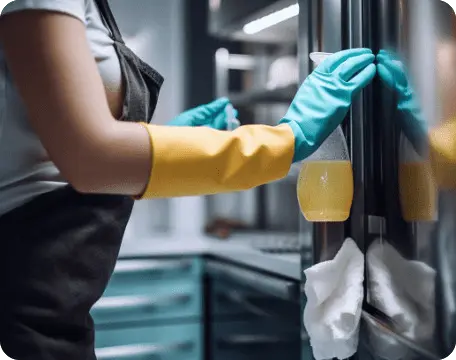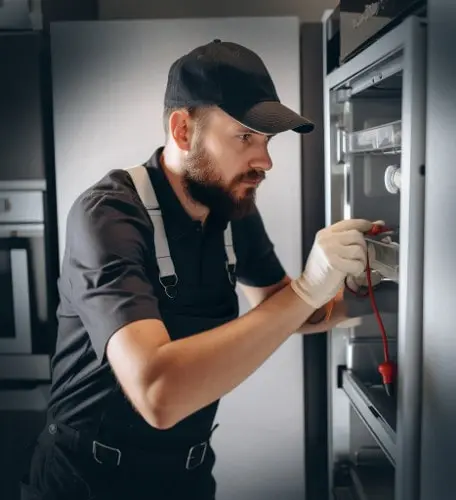Call Us Now: (587) 952 7077
Opening Hours: Mon - Fri: 7am - 7pm; Saturday: 7am - 3 pm
Call Us Now: (587) 952 7077
Opening Hours: Mon - Fri: 7am - 7pm; Saturday: 7am - 3 pm

The Key to Appliance Longevity
In today’s modern world, appliances have become an integral part of our daily lives. From refrigerators to dishwashers, ovens to washing machines, these appliances simplify our chores and enhance our comfort. However, like any complex machinery, appliances require regular maintenance to function optimally and avoid unexpected breakdowns. The simple act of maintenance can save us from the inconvenience of appliance failures and potentially costly repairs. By understanding the importance of maintenance and taking proactive measures, we can prolong the lifespan of our appliances and enjoy their benefits for years to come. One of the primary reasons to maintain appliances is to prevent breakdowns. Neglected or improperly maintained appliances are more prone to malfunctioning or even complete failure.
Regular cleaning is an essential part of appliance maintenance. Over time, appliances accumulate dirt, dust, grease, and food residues, which can affect their performance and efficiency. For example, clogged filters in a dishwasher can lead to poor cleaning results, while a refrigerator with dirty condenser coils may struggle to maintain the desired temperature. By regularly cleaning these components, we can prevent them from becoming a breeding ground for bacteria, improve energy efficiency, and extend the life of the appliance.
Clean the interior and exterior of your refrigerator at least once a month. Wipe down shelves, drawers, and compartments with warm, soapy water, and use a vacuum attachment to clean the coils and compressor. This can improve energy efficiency and prevent breakdowns.
Remove any food debris from the dishwasher after each use, and wipe down the interior with a damp cloth. Clean the spray arm, filters, and detergent dispenser regularly to prevent clogs and ensure efficient cleaning.
Use a non-abrasive cleaner to wipe down the inside of your oven, and clean the oven door and control panel with a damp cloth. Regular cleaning can prevent grease buildup and prevent safety hazards.
Wipe down the inside of your washing machine with a damp cloth after each use, and clean the detergent dispenser and drum every few weeks. This can prevent mold and mildew buildup and keep your clothes smelling fresh.
Remove lint from the lint trap after every use, and clean the vent hose and exterior vent regularly to prevent clogs and fire hazards.
Start by removing any removable parts such as burner grates, knobs, and drip pans. Soak them in warm, soapy water to loosen dirt and grease. Use a gentle, non-abrasive cleaner and water to clean the stovetop surface.
Regular freezer cleaning, ideally every 3-6 months, helps maintain a clean and odor-free environment and ensures efficient cooling. By following our simple tips, you can keep your freezer in optimal condition and preserve the quality of your frozen foods.
Regular cleaning and maintenance of your microwave help prolong its lifespan and ensure optimal performance. By following these simple cleaning tips, you can keep your microwave clean, fresh, and ready for your next meal.
Before cleaning, make sure to turn off and unplug the wine cooler. Remove all the bottles and shelves from the cooler, placing the bottles in a suitable location to maintain their temperature.
In addition to cleaning, lubrication plays a crucial role in appliance maintenance. Moving parts such as motors, fans, and hinges benefit from periodic lubrication to reduce friction and wear. Lubricating these components not only ensures smoother operation but also minimizes the risk of overheating or excessive strain on the motor. Following the manufacturer’s guidelines for lubrication intervals and using the appropriate lubricants can significantly contribute to the longevity of the appliance. Inspection is another vital aspect of appliance maintenance. By inspecting appliances regularly, we can identify signs of wear, loose connections, leaks, or damaged parts. Timely detection of these issues allows for prompt repair or replacement, preventing further damage to the appliance or potential hazards. It is advisable to refer to the appliance’s user manual or seek professional assistance for specific inspection procedures and safety guidelines.


Components such as motors, compressors, heating elements, and electronic controls can wear out over time due to constant use and exposure to environmental factors. Regular maintenance, including cleaning, lubrication, and inspection, can help identify potential issues before they escalate into major problems. So, moreover, proper maintenance of appliances often involves replacing worn-out or damaged parts. It is essential to use genuine replacement parts recommended by the manufacturer to ensure compatibility and optimal performance. Genuine parts are designed specifically for the appliance model, ensuring the best fit and functionality. Using counterfeit or incompatible parts may compromise the appliance’s operation and void any warranties. Not only does appliance maintenance prevent breakdowns, but it also offers other significant benefits. Regularly maintained appliances tend to operate more efficiently, consuming less energy and reducing utility bills. We contribute to a sustainable and eco-friendly lifestyle by keeping appliances in top condition. Furthermore, maintaining appliances helps retain their resale value, should we decide to upgrade or sell them in the future.
To make appliance maintenance a seamless part of our routine, it is helpful to create a schedule or checklist. Simple tasks such as wiping down surfaces, cleaning filters, checking seals, and inspecting cords can be done regularly. Many manufacturers provide maintenance guidelines specific to their appliances, which can serve as a valuable resource for maintenance routines but seeking professional assistance for complex maintenance tasks is recommended to ensure comprehensive care.
